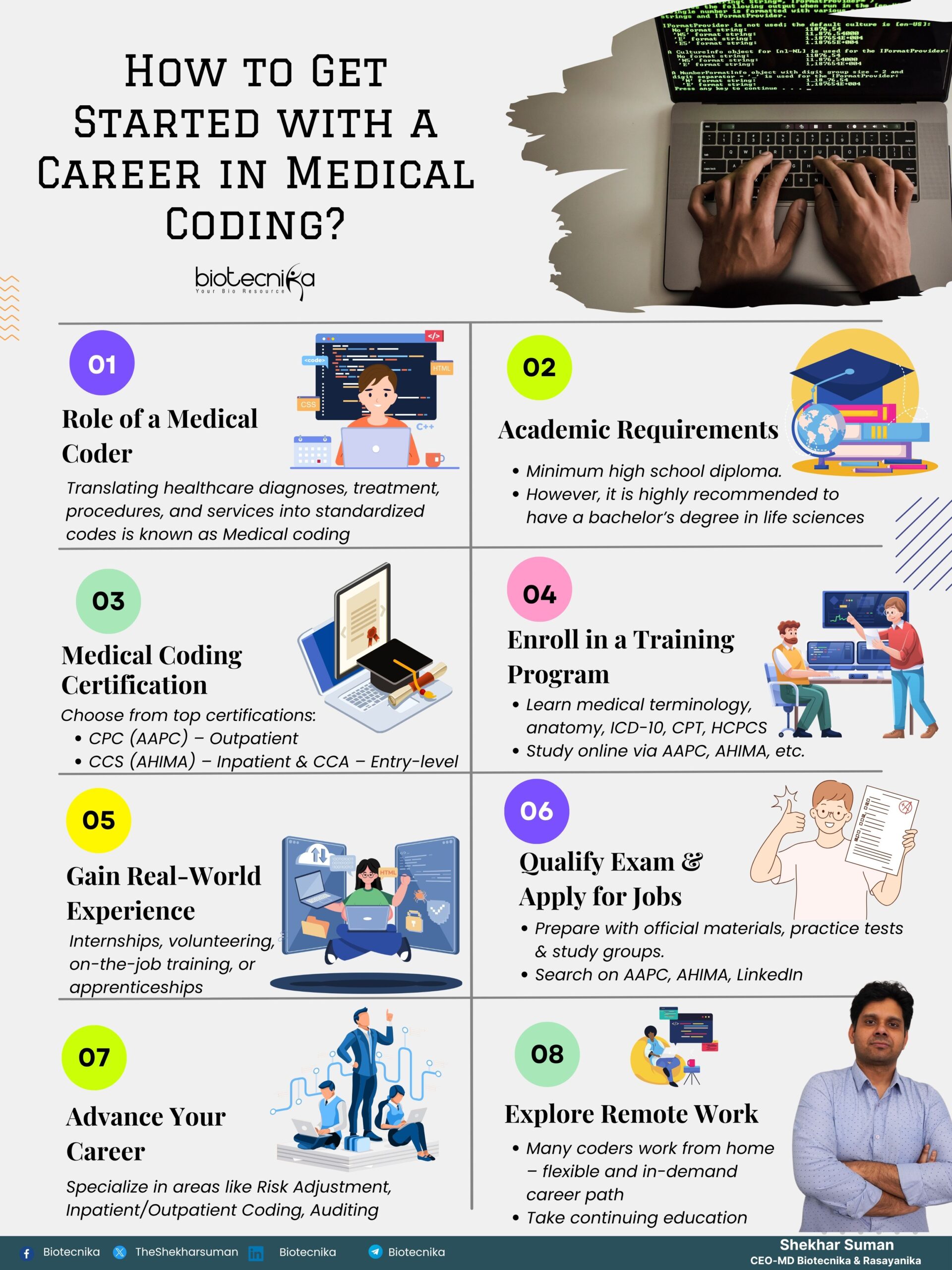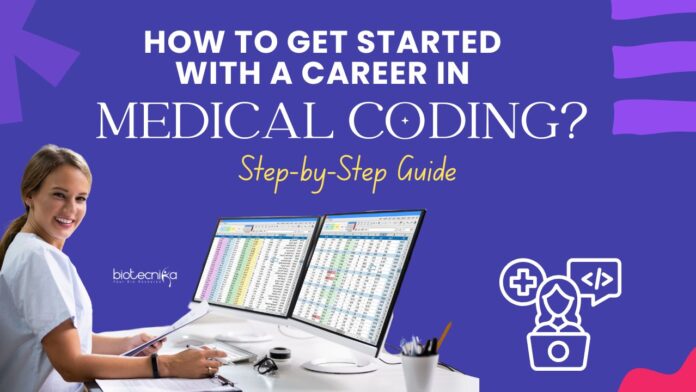Table of Contents
Career In Medical Coding For Life Science
Have you ever thought about building a career in the healthcare industry with a medical degree? A profession that offers you flexible working hours, job security, and the option to work from home. Sound impossible? Not anymore. Thanks to rapidly evolving healthcare technology, a new career path has emerged – medical coding, a field that has quietly become the backbone of the healthcare industry. Medical coding has accurately recorded patients’ information and improved the proper insurance billing.
With the advancing healthcare services, medical coders are in high demand. In recent years, it has become an excellent career choice with job stability and growth. If you are looking for a career change or a work-from-home opportunity, then here is the best option for you. This step-by-step guide will help you get started with a career in medical coding.
From academic to certification, from job search strategies to career advancement, let’s explore this rewarding career.
Step 1: What is the Role of a Medical Coder?
The process of translating healthcare diagnoses, treatment, procedures, and services into standardized codes is known as Medical coding. With the help of these codes, the healthcare sector manages its medical documentation, insurance process, and healthcare-related tasks. Every time you visit a hospital for a consultation, procedure, or any medical treatment, the hospital will record the details. The medical coder will take this data and convert it into universal codes. Healthcare institutions, insurance companies, and government organisations can use these codes.
Over the years, medical coding has become a language of healthcare. This ensures the consistency of medical data. It makes sure that all the data is recorded, analyzed, and reimbursed accurately. If it is not done properly, then the healthcare system will struggle with financial loss, data misinterpretation, and incompetent patient care.
Why Is Medical Coding Important?
Career In Medical Coding For Life Science
In this rapidly changing healthcare sector, medical coding plays an important role in safeguarding medical data. Here are a few reasons why it is important.
- Ensures Accurate Billing: Insurance companies rely on codes to process claims.
- Improves Healthcare Efficiency: Helps hospitals and clinics maintain organized medical records.
- Prevents Fraud and Errors: Proper coding ensures compliance with regulations.
- Supports Medical Research: Standardized codes contribute to public health research and analysis.
Common Medical Coding Systems:
| Coding System | Purpose |
| ICD-10-CM (International Classification of Diseases, 10th Revision, Clinical Modification) | Used for diagnosing diseases and conditions |
| CPT (Current Procedural Terminology) | Codes for medical procedures and services |
| HCPCS (Healthcare Common Procedure Coding System) | Used for medical equipment, outpatient services, and Medicare claims |
Key Responsibilities of a Medical Coder:
| Task | Description |
| Reviewing patient records | Ensuring medical documentation is accurate and complete |
| Assigning medical codes | Translating diagnoses and procedures into standardized codes |
| Communicating with healthcare providers | Clarifying unclear documentation |
| Ensuring compliance | Adhering to healthcare regulations like HIPAA |
| Submitting claims to insurance companies | Making sure claims are accurate and reimbursed properly |
Step 2: What are the Academic Requirements?
This field of healthcare is rewarding and accessible. To build a career in medical coding, one needs a minimum high school diploma. However, it is highly recommended to have a bachelor’s degree in life sciences to excel. One needs to have a strong basis in medical terminology, anatomy, and coding language. This will help in understanding the healthcare requirements and regulations more easily.
Here are three common academic paths that will help you build a successful career in medical coding:
| Academic Pathway | Time Required | Pros | Cons |
| Self-Study + Certification | 3–6 months | Affordable, flexible, and fast | Requires strong self-discipline |
| Medical Coding Certificate Programs | 6–12 months | Structured learning with hands-on practice | Can be expensive |
| Associate’s Degree in Health Information Technology | 2 years | Broader career opportunities | More time-consuming and costly |
Top Recommended Books for Medical Coding:
- Books:
- Step-by-Step Medical Coding by Carol J. Buck
- ICD-10-CM Official Guidelines for Coding and Reporting – (Essential for learning ICD-10)
- CPT Professional Edition – American Medical Association (Must-have for CPT codes)
Step 3: Choose a Medical Coding Certification
To become a professional medical coder, one needs to complete a certification Program. The companies prefer certified candidates over others. The certifications help the individual to gain formal training and qualify exams.
Top Medical Coding Certifications:
| Certification | Issuing Organization | Best For |
| Certified Professional Coder (CPC) | AAPC | Physician offices and outpatient settings |
| Certified Coding Specialist (CCS) | AHIMA | Inpatient and outpatient hospital coding |
| Certified Coding Associate (CCA) | AHIMA | Entry-level coders without experience |
| Certified Inpatient Coder (CIC) | AAPC | Hospital inpatient coding |
Step 4: Enroll in a Medical Coding Training Program
After selecting the right certification, enroll in a medical coding training program. If you are thinking, where can you find them? Here is the list of institutions.
| Institution Type | Examples |
| Community Colleges | Local colleges offering medical billing and coding programs |
| Universities | Health information management programs |
| Online Learning Platforms | AAPC, AHIMA, Coursera, Udemy, edX, etc. |
| Hospitals & Employers | Some healthcare facilities provide training to employees |
What You Will Learn in a Medical Coding Program?
Necessary For a Career In Medical Coding For Life Science.
In a medical coding program, you will focus on topics related to:
- Medical terminology
- Anatomy and physiology
- ICD-10, CPT, and HCPCS coding systems
- Insurance and reimbursement processes
- Healthcare laws and compliance (HIPAA, Medicare, Medicaid)
Biotecnika’s 3-Month Medical Coding Training Program
Looking for a trusted and structured training pathway with real-world exposure?
✅ Enroll in Biotecnika’s Medical Coding Training Program – a comprehensive program that includes:
-
3 months of hands-on project work
-
CPC exam preparation
-
100% placement support
-
Guided experience to build your resume & skills
Whether you’re a fresher or looking to shift careers, this program is designed to give you everything you need to kickstart your medical coding career with confidence.
Step 5: Gain Hands-On Experience
In today’s competitive job market, employers hire candidates with practical experience. The candidates with hands-on experience have been given the opportunity before the others. If you are worried about how to gain experience, here are some ways that will help you to stand out in the competition.
Ways to Get Medical Coding Experience:
| Experience Type | How to Gain It |
| Internships | Many hospitals and clinics offer internships for students |
| Volunteer Work | Free clinics and non-profits often need coding assistance |
| On-the-Job Training | Some healthcare employers train entry-level coders |
| Apprenticeships | AAPC offers a CPC-A designation for beginners |
Step 6: Pass Your Medical Coding Certification Exam
After completing your training, you need to qualify for the exam. Passing these certification exams will help you qualify as a professional medical coder. Most of them are multiple-choice ones. The following tips will help you to prepare better for your exams.
How to Prepare for the Certification Exam:
- Study the official coding guidelines from AAPC or AHIMA.
- Take online practice exams to familiarize yourself with the test format.
- Join study groups and online forums for support.
- Use exam prep books from AAPC or AHIMA.
Step 7: Apply for Medical Coding Jobs
Once you have successfully qualified for your exams. You can start applying for the medical coding jobs. Platforms like AAPC, AHIMA, Biotecnika, and LinkedIn will help you search for better opportunities. Look for a Medical coder, inpatient coder, or health information technician jobs.
In your resume, highlight certifications, coding skills, and relevant experience. Add details about internships or volunteer work. Prepare for interviews by reviewing common questions. Work on scenario-based problem-solving and coding assessments.
Networking plays an important role. Join AAPC and AHIMA communities. Attend industry webinars, and connect with recruiters. With persistence and preparation, you will secure a rewarding career in medical coding.

Step 8: Gain Advanced Specializations for a Strong Career In Medical Coding
Once you gain experience, you can specialize in specific areas to increase your earning potential. These will help to climb the ladder of success faster.
Specialization Options:
| Specialization | Best For |
| Risk Adjustment Coder (CRC) | Medicare and insurance risk coding |
| Certified Inpatient Coder (CIC) | Hospital inpatient coding |
| Certified Outpatient Coder (COC) | Outpatient procedures and services |
| Medical Auditing (CPMA) | Compliance and fraud prevention |
Step 9: Explore Remote Work Opportunities
Many medical coders work from home. Making it an attractive career for those seeking flexibility.
How to Find Remote Medical Coding Jobs?
- Look for job postings with “remote” or “work from home” in the title.
- Apply at companies specializing in remote coding, like Aviacode and Maxim Healthcare.
- Build a professional profile on LinkedIn to attract job offers.
Medical coding is more than just translating medical procedures into numbers. It’s a vital role that keeps the healthcare system running smoothly. By following this guide, you now have a clear roadmap to becoming a medical coder, from obtaining the right education and certifications to gaining experience and securing a job.
With continuous learning and specialization, you can climb the career ladder and unlock even greater opportunities in healthcare. Whether you work in hospitals, private clinics, or remotely, medical coding offers a fulfilling and financially stable career.
Whether you’re just starting out or switching careers, the time to act is now. Enroll in a certified training program, build your skills, and step into a high-demand, flexible, and rewarding role in the healthcare industry as a certified medical coder.
Career In Medical Coding For Life Science





























